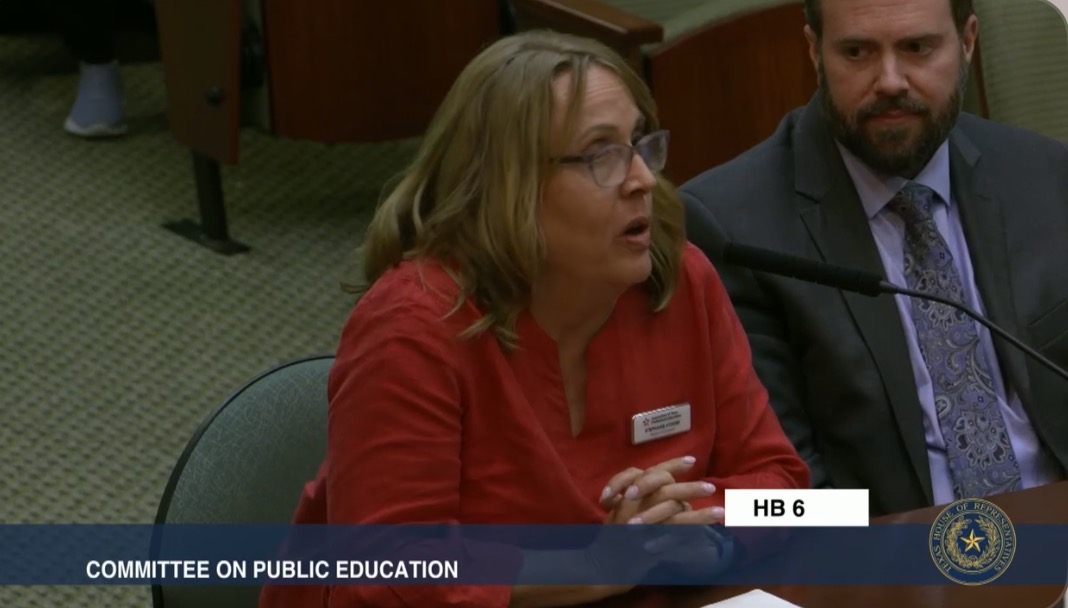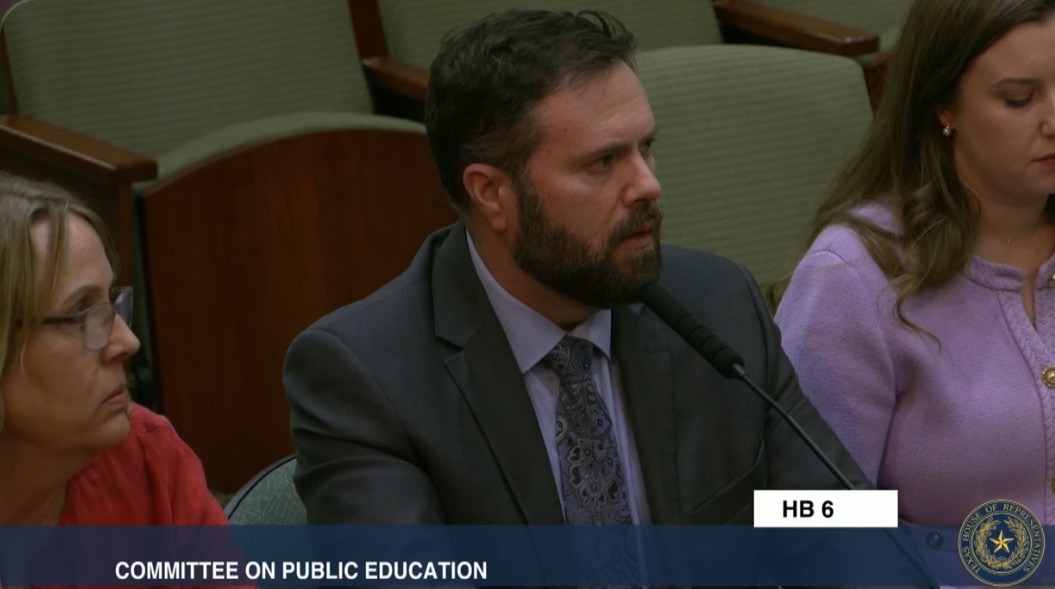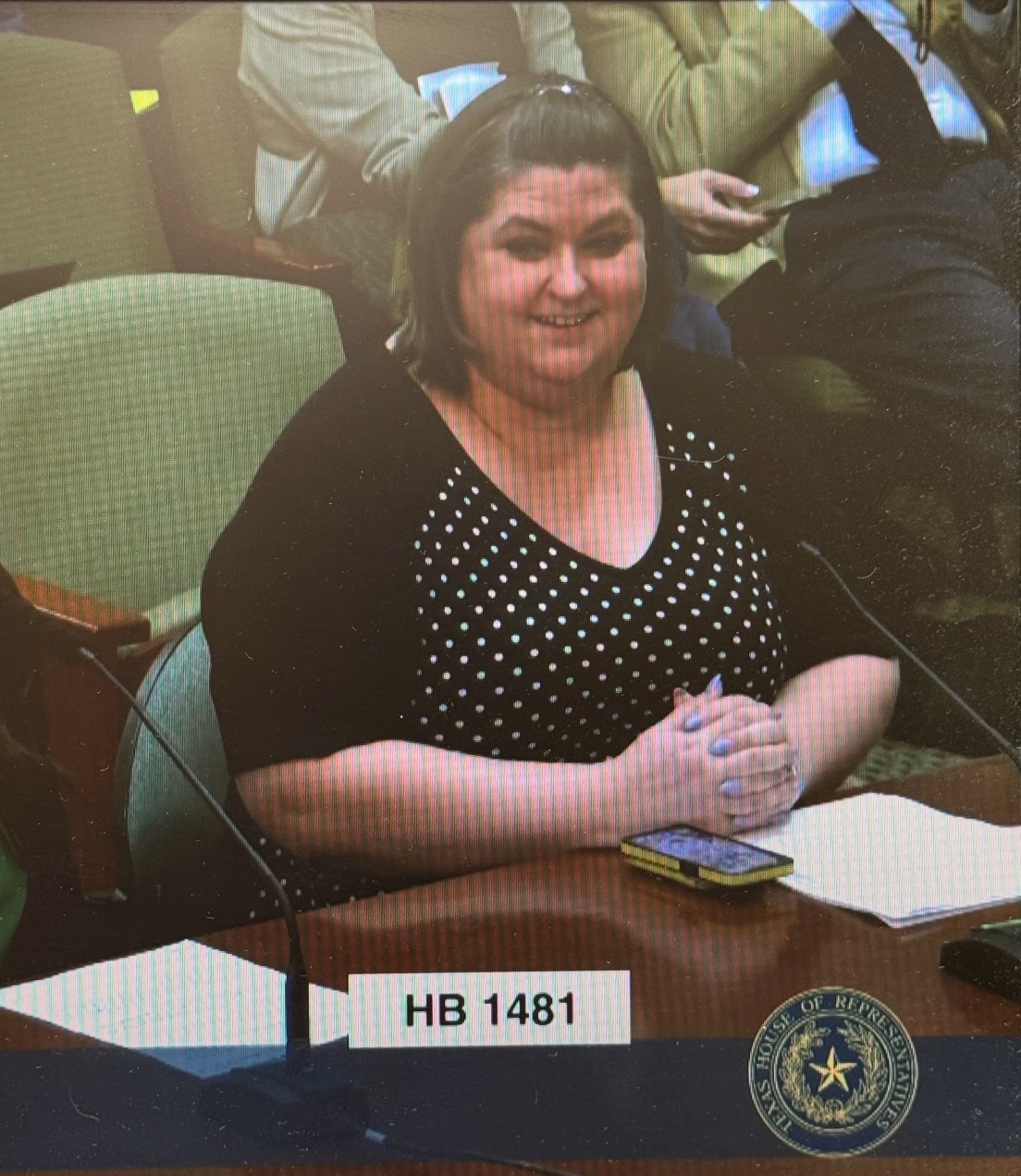House Public Education hears bills on student discipline and school cell phone policies

Date Posted: 3/19/2025 | Author: Tricia Cave

The House Public Education Committee met Tuesday to discuss its first regular slate of bills during the 89th legislative session. During previous hearings, the committee had only taken up a single bill per hearing. This week, the committee heard nine bills with the broad theme of the day student safety and discipline:

- ATPE-supported House Bill (HB) 6 by Rep. Jeff Leach (R–Plano) would expand a school’s right to use out-of-school suspensions to discipline students, expand the amount of time allowed for in-school suspensions, and create a virtual disciplinary alternative education program (DAEP) for students expelled from school. The bill also provides some additional protections for students experiencing homelessness. ATPE Government Relations Director Monty Exter as well as Region 13 ATPE Director Stephanie Stoebe testified in favor of the bill. Stoebe testified about her experiences with students who were pervasively violent and disruptive in her own classroom, sharing how she had been injured several times at the hands of a student. Exter’s testimony focused on the need to have more well-rounded disciplinary policies and procedures, including educator training aimed at classroom management and de-escalation. ATPE also provided written testimony to the committee. Dozens of educators from all over the state also shared their stories, including Corsicana ISD assistant principal Candra Rogers, whose story made national news at the beginning of this school year when a student threw a hanger at her, blinding her in one eye. That student, according to Rogers, had a history of discipline issues and had been involved in “clear the classroom” incidents several times. Exter was interviewed by CBS Austin about this bill.
- ATPE-supported HB 27 by Rep. Ken King (R–Canadian) would change the high school social studies curriculum to replace the required economics course with a personal financial literacy course. Economics would remain an optional course students could take to receive their third social studies credit, along with world history and world geography. Personal financial literacy is currently provided in schools but as an elective rather than as a required course.
- HB 123 by Rep. Harold Dutton (D–Houston) would expand testing in lower grades K-3 with the intent of catching literacy and numeracy issues early. The bill would also require that K-8 teachers who teach math attend a math academy, and it would provide funding for early literacy interventions. ATPE Governmental Relations Director Monty Exter testified on the bill, stating that while ATPE doesn’t oppose the reading or math academies, we are hopeful that lessons from the rollout of the reading academies will be applied to implementation of the math academies, preventing the issues we saw with regard to the unpaid time required of educators originally, as well as the lack of relevant information the academies provided to many experienced educators. He also expressed concern about the addition of testing in lower grades, which Exter argued isn’t needed because educators are already assessing their students in those early grades for reading proficiency. With regard to the bill’s high-intensity tutoring provision and the $250 allotment provided for this, Exter pointed out that the funding is capped at 10% of students, which would prevent schools from hiring paraprofessionals to deliver this tutoring because 100 students would be needed to pay for one paraprofessional.
- ATPE-supported HB 210 by Rep. Ryan Guillen (R–Rio Grande City) seeks to prevent conflicts of interest for members of a district board of trustees. The bill would prevent districts from selecting vendors in which a board member has a business interest.
- ATPE-supported HB 213 by Rep. Mary Gonzalez (D–El Paso) would classify chronically absent students as “at risk” and require collection and reporting of data regarding these students.
- ATPE-supported HB 222 by Rep. James Talarico (D–Round Rock), would allow districts to use funds from the school safety allotment to provide classroom and behavioral management training to educators.
- HB 610 by Rep. Terri Leo-Wilson (R–Galveston) would require that the severance payment to a school district superintendent equal no more than six months of their salary.
- ATPE-supported HB 1085 by Rep. Pat Curry (R–Waco) would allow districts to offer a lifetime recreation and outdoor pursuits course to satisfy a student’s physical education requirements. This course would be created by the State Board of Education (SBOE) in partnership with Texas Parks and Wildlife.
- HB 1481 by Rep. Caroline Fairly (R–Amarillo) would ban student cell phones during the instructional day. The bill was written to require districts to adopt a policy for its enforcement. However, it would have required the policy to include taking up and storing phones as the mechanism for banning their use. Many districts have already enacted local policies that effectively disallow cell phone use during the instructional day without requiring that phones be taken up and stored. During the hearing, a committee substitute was laid out, which had been made available prior the hearing. ATPE Lobbyist Tricia Cave testified that the language in the committee substitute was too prescriptive, disallowing the local control the bill originally claimed to protect. While ATPE registered a neutral position on the bill due to its overly prescriptive nature, we support requiring districts to have a policy to address cell phone use during the school day, which has become a problem in many schools. (Read ATPE’s written testimony.) We are working with the author to bring the bill more into line with her stated intentions of requiring districts to address the issue in the way that makes best sense for their local communities. The Texas Tribune mentioned Cave’s testimony in its recap of the HB 1481 discussion. ATPE encourages you to participate in our current Advocacy Central campaign to thank Fairly for filing the bill and ask her to adopt language that protects local control as districts adopt cell phone policies.

These bills were all left pending in committee.
Additionally, the committee voted out two bills previously heard in the Subcommittee on Academic and Career-Oriented Education. These bills will now advance to the House floor, pending scheduling by the House Calendars Committee.
- ATPE-supported HB 120 by Rep. Keith Bell (R–Forney) focuses on enhancing career and technical education (CTE) and establishing support programs for high school students. The bill was passed out of committee 15-0. CTE course expansion is one of the emergency items declared by Gov. Greg Abbott (R) in his February State of the State address. Key points of the bill include:
- Career and Technology Education (CTE): The bill aims to ensure career and technical education courses meet the needs of the workforce at large and that the courses offered are rigorous and students are being properly trained, leading to industry-recognized certifications or degrees.
- Military Pathway Grant Program: This new program would provide grants of $50,000 to school districts to establish Junior Reserve Officers' Training Corps (JROTC) programs, administer the Armed Services Vocational Aptitude Battery (ASVAB), and offer career counseling.
- High School Advising Program: The bill proposes a program to offer college or career advising for high school students by partnering with institutions of higher education, employers, or workforce boards to provide guidance. The advisors must have a caseload of no more than 200 students and prioritize junior and senior students.
- Funding and Support: The bill includes provisions for funding these initiatives under the Foundation School Program, with a focus on supporting the development and expansion of CTE programs and advisory services.
- HB 20 by Rep. Gary Gates (R–Rosenberg) would establish an Applied Sciences Pathway Program in Texas. This bill was passed out of committee on a 14-1 vote, with only Dutton voting no. The program would help high school students earn both a high school diploma and a certificate from a higher education institution in various fields such as plumbing, welding, aviation maintenance, and HVAC, with the intention of serving labor market trends and funneling interested students toward high-growth career pathways. “This bill is focused on the 50% of students who never go to college,” Gates said in his layout of the bill. “It’s trying to provide a meaningful career pathway for high-paying jobs in areas where we have shortages … jobs where we are lacking not only in Texas but throughout the country.”
The House Public Education Committee is expected to meet again March 25.
CONVERSATION
RECOMMENDED FOR YOU

02/16/2026
SBEC finalizes rules to comply with new Texas legislation passed in 2025
The State Board for Educator Certification met Feb. 13, 2026, to adopt final rules affecting educator certification and discipline.

02/13/2026
Teach the Vote’s Week in Review: Feb. 13, 2026
Early voting for the March primary election begins Tuesday, Feb. 17, and runs through Friday, Feb. 27.

02/06/2026
Teach the Vote’s Week in Review: Feb. 6, 2026
A special election runoff in Texas Senate (SD) 9 results in a dramatic party flip in a Republican stronghold.

